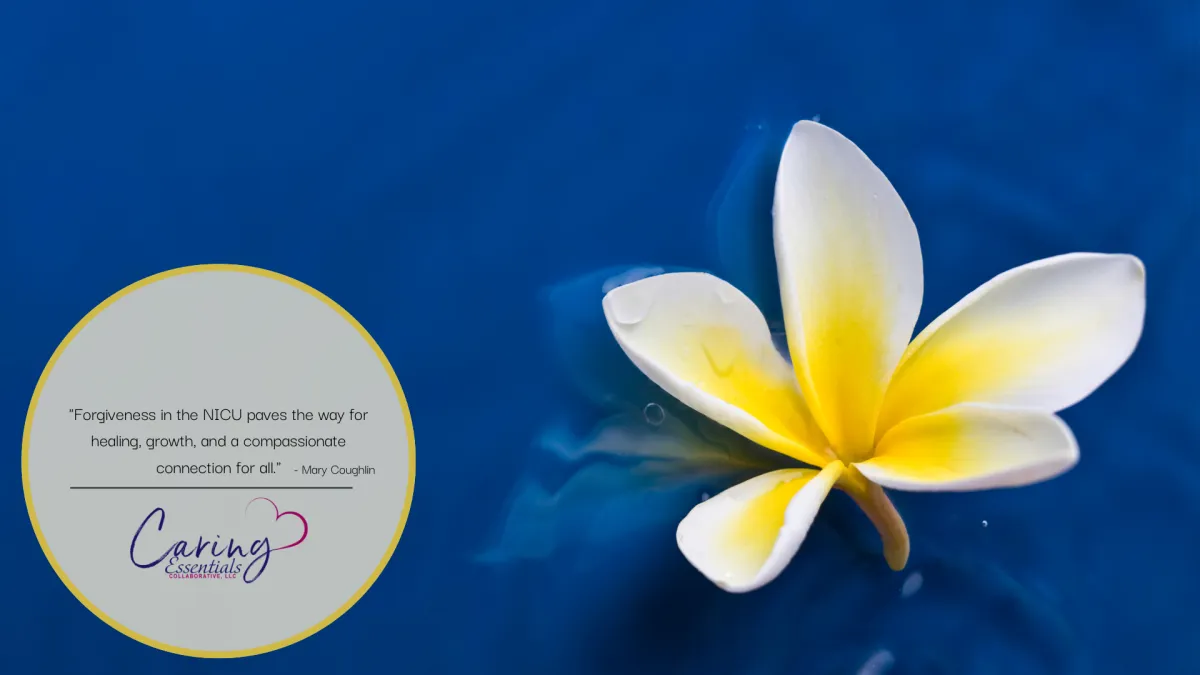
Embracing Forgiveness in the NICU: A Path to Healing and Growth
"Forgiveness in the NICU paves the way for healing, growth, and a compassionate connection for all." - Mary Coughlin
I want to explore a deeply transformative aspect of Trauma-Informed Developmental Care (TIDC)—forgiveness. In the high-stakes environment of the Neonatal Intensive Care Unit (NICU), forgiveness is a powerful tool that fosters healing and growth for babies, families, and clinicians.
Forgiveness for Babies
While it might seem unusual to talk about forgiveness in the context of newborns, it’s about the compassionate care we provide when things don’t go as planned. Babies in the NICU often face numerous challenges, and despite our best efforts, outcomes aren’t always perfect. Forgiveness here means embracing our humanity, acknowledging our limitations, and continuing to provide the best care possible with love and compassion. This attitude helps create an environment where every baby is supported holistically, recognizing that healing is a journey, not a destination.
Forgiveness for Families
For families, the NICU experience can be a whirlwind of emotions—fear, anxiety, hope, and sometimes, disappointment. Mistakes and misunderstandings can happen, and it’s crucial for families to feel they can forgive these moments. Encouraging families to embrace forgiveness helps them cope with the emotional strain and fosters resilience. When families forgive themselves for moments of doubt or guilt, and forgive the care team for any perceived shortcomings, they can focus more on their baby’s recovery and less on past grievances. This mindset shift is empowering, allowing families to move forward with hope and trust.
Forgiveness Among Clinicians
In the NICU, clinicians work under intense pressure, and the stakes are incredibly high. Mistakes, despite our best intentions, can occur. Forgiveness in this context is about self-compassion and mutual support. When clinicians forgive themselves for errors or oversights, they can learn and grow from these experiences rather than being paralyzed by them. This self-forgiveness is crucial for maintaining mental health and professional confidence. Additionally, fostering a culture of forgiveness among colleagues helps build a supportive and collaborative environment. When we forgive each other, we strengthen our team and improve the quality of care we provide.
The Transformative Power of Forgiveness
Forgiveness in the NICU isn’t just a personal act; it’s a collective ethos that can transform the care environment. Here’s how we can cultivate forgiveness in our practice:
1. Encourage Open Dialogue: Create a safe space for families and clinicians to express their feelings and concerns. Open dialogue helps clear misunderstandings and paves the way for forgiveness.
2. Emphasize Learning Over Blame: When mistakes happen, focus on what can be learned rather than assigning blame. This approach fosters a culture of continuous improvement and mutual support.
3. Practice Self-Compassion: Encourage clinicians to practice self-compassion and forgiveness. Remind them that perfection isn’t the goal; compassionate, patient-centered care is.
4. Support Families Emotionally: Provide families with emotional support and counseling if needed. Helping them navigate their feelings and encouraging forgiveness can be incredibly healing.
5. Lead by Example: Model forgiveness in your actions and interactions. When leaders demonstrate forgiveness, it sets a powerful example for the entire team.
The Ripple Effect of Forgiveness
When forgiveness is woven into the fabric of the NICU, the benefits are profound. Babies receive care from a team that is resilient, compassionate, and focused on their well-being. Families feel supported and understood, empowering them to participate fully in their baby’s care. Clinicians work in an environment that values growth and mutual support, reducing burnout and fostering a positive work culture.
Let’s commit to embracing forgiveness as a core principle of our practice. By doing so, we can create a NICU environment that supports healing, growth, and compassion for everyone involved.
Build the B.U.F.F.E.R.I.N.G and Become the BUFFER!
With heartfelt compassion,
Mary
I’d love to hear your thoughts and experiences about the power of forgiveness in the NICU. Together, we can continue to enhance our practice and make a profound difference in the lives of the babies and families we serve.
